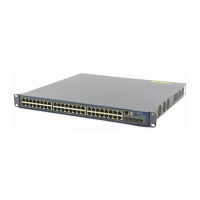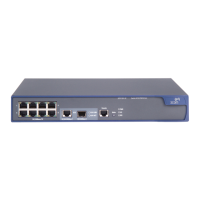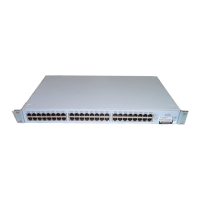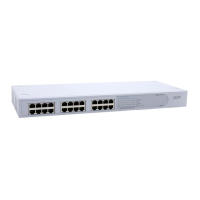670 CHAPTER 47: PIM CONFIGURATION
existing unicast route, and is independent of PIM. The RPF interface must be
PIM-enabled, and the RPF neighbor must also be a PIM neighbor. If PIM is not
enabled on the router where the RPF interface or the RPF neighbor resides, the
establishment of a multicast distribution tree will surely fail, causing abnormal
multicast forwarding.
■ Because a hello message does not carry the PIM mode information, a router
running PIM is unable to know what PIM mode its PIM neighbor is running. If
different PIM modes are enabled on the RPF interface and on the
corresponding interface of the RPF neighbor router, the establishment of a
multicast distribution tree will surely fail, causing abnormal multicast
forwarding.
■ The same PIM mode must run on the entire network. Otherwise, the
establishment of a multicast distribution tree will surely fail, causing abnormal
multicast forwarding.
Solution
1 Check unicast routes. Use the display ip routing-table command to check
whether a unicast route exists from the receiver host to the multicast source.
2 Check that PIM is enabled on the interfaces, especially on the RPF interface. Use
the display pim interface command to view the PIM information on each
interface. If PIM is not enabled on the interface, use the pim dm or pim sm
command to enable PIM-DM or PIM-SM.
3 Check that the RPF neighbor is a PIM neighbor. Use the display pim neighbor
command to view the PIM neighbor information.
4 Check that PIM and IGMP are enabled on the interfaces directly connecting to the
multicast source and to the receivers.
5 Check that the same PIM mode is enabled on related interfaces. Use the display
pim interface verbose command to check whether the same PIM mode is
enabled on the RPF interface and the corresponding interface of the RPF neighbor
router.
6 Check that the same PIM mode is enabled on all the routers in the entire network.
Make sure that the same PIM mode is enabled on all the routers: PIM-SM on all
routers, or PIM-DM on all routers. In the case of PIM-SM, also check that the BSR
and RP configurations are correct.
Multicast Data
Abnormally Terminated
on an Intermediate
Router
Symptom
An intermediate router can receive multicast data successfully, but the data cannot
reach the last hop router. An interface on the intermediate router receives data but
no corresponding (S, G) entry is created in the PIM routing table.
Analysis
■ If a multicast forwarding boundary has been configured through the multicast
boundary command, any multicast packet will be kept from crossing the
boundary, and therefore no routing entry can be created in the PIM routing
table.
■ In addition, the source-policy command is used to filter received multicast
packets. If the multicast data fails to pass the ACL rule defined in this
command, PIM cannot create the route entry, either.

